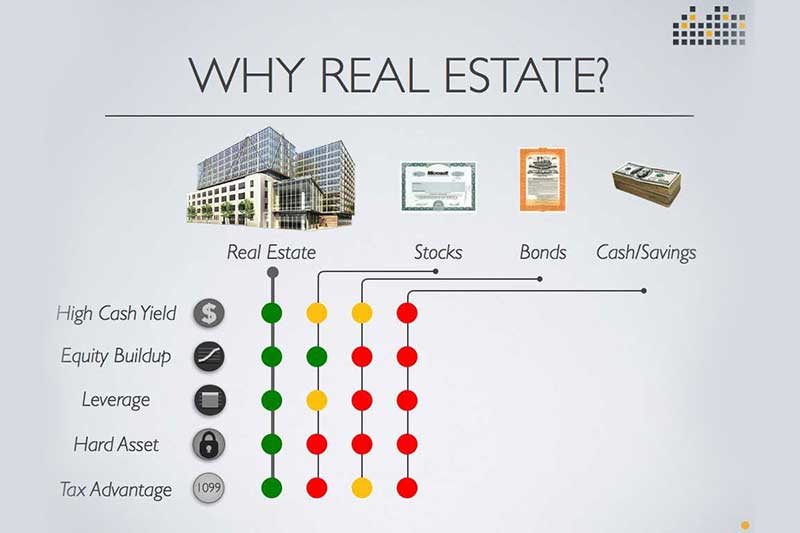
What is Real Estate Investing?
Real estate investing is a popular way to build wealth . Real estate investors purchase, manage, and sell properties to earn a return on investment . This guide provides an overview of what it means to be a real estate investor, covering different types of real estate investments, investment strategies , and potential challenges.
Different Real Estate Investment Options
1. Investing in Residential Properties
- Single-Family Homes: Houses meant for single-family occupancy. These are common among first-time investors due to their lower cost and easier management .
- Multi-Family Properties: Properties that house multiple families, including duplexes and apartments. They provide more rental revenue but require more management .
- Vacation Rentals: Homes leased for short stays, typically via sites like Airbnb. These can bring in substantial earnings but may have more frequent vacancies and management needs .
2. Investing in Commercial Properties
- Office Buildings: Buildings rented out for office purposes. They often have long-term leases , ensuring stable cash flow.
- Retail Properties: Properties rented by retail businesses, including shops and malls. Success is tied to the tenants’ business performance .
- Industrial Properties: Industrial buildings such as factories and storage units. These have extended contracts and minimal management requirements .
3. Industrial Real Estate
- Warehouses: Buildings for storing products and supplies. Demand is fueled by online shopping expansion .
- Manufacturing Facilities: Sites for the production and assembly of goods. These require specialized knowledge for investment .
- Distribution Centers: Facilities for distributing goods. Key in the logistics network.
4. Investing in Land
- Undeveloped Land: Vacant plots awaiting development. It offers opportunities for building but can be risky .
- Developed Land: Property readied for building projects. Requires major capital and development skills.
- Agricultural Land: Farmland used for growing crops or raising livestock. Offers long-term stability but requires knowledge of agricultural markets .
Strategies for Real Estate Investing
1. Long-Term Holding Strategy
- Overview: Acquire and lease properties long-term to enjoy rental income and appreciation.
- Pros: Steady cash flow, potential tax benefits, long-term appreciation.
- Cons: Requires property management, tied-up capital, market risk.
2. Property Flipping
- Overview: Purchase undervalued homes, refurbish them, and sell for profit.
- Pros: High profit potential in a short period, property improvement.
- Cons: Significant risk, needs renovation expertise, reliant on market conditions.
3. Wholesaling
- Overview: Locate undervalued homes, contract them, and transfer the contract for a fee.
- Pros: Low capital requirement, quick turnaround, minimal property management.
- Cons: Needs to find sellers and buyers, lower profit margins.
4. Investing in REITs
- Overview: Buy shares in companies that manage income-generating properties.
- Pros: Liquidity, diversification, passive income, professional management.
- Cons: Susceptible to market swings, limited influence, associated costs.
5. Real Estate Crowdfunding
- Overview: Invest collectively in real estate projects via crowdfunding sites.
- Pros: Affordable entry, diverse investments, involvement in significant projects.
- Cons: Reduced control over investment, platform costs, potential risks.
How to Become a Real Estate Investor
Education and Research:
Learn the Basics: Understand real estate markets, financing options, property management, and investment strategies.
Networking: Join investor groups, go to real estate seminars, and make connections with other investors.
Set Investment Goals:
Define Objectives: Clarify your investment aims, focusing on income
Set Investment Goals
- Define Objectives: Determine your investment goals, such as income generation, capital appreciation, or portfolio diversification.
- Risk Tolerance: Evaluate your risk tolerance to select suitable investment strategies.
Develop a Business Plan
- Market Analysis: Analyze markets, property categories, and expected returns.
- Financing Strategy: Prepare a financing plan using mortgages, private loans, and savings.
Build a Team
- Key Professionals: Assemble a team with agents, lawyers, accountants, managers, and contractors.
- Networking: Continue building relationships with professionals who can assist you.
Start Small
- Initial Investment: Start with modest investments or basic projects for learning.
- Learn and Adapt: Adapt your approach based on lessons from initial investments.
Scale Up
- Growth: Expand your investments as your experience and confidence grow.
- Diversification: Broaden your investment portfolio with varied properties and areas.
Challenges and Risks in Real Estate Investing | Potential Challenges and Risks
1. Market Volatility
- Economic Factors: Real estate markets real estate wholesaling for dummies can be influenced by economic changes, interest rates, and government policies.
- Mitigation: Keep up with market trends and adapt your strategies.
2. Property Management
- Tenant Issues: Dealing with tenant complaints, vacancies, and rent collection can be challenging.
- Solutions: Consider hiring a management company or enhancing your management skills.
3. Financing and Cash Flow
- Funding Challenges: Obtaining wholesaling real estate property financing and ensuring cash flow stability can be hard.
- Strategies: Have a solid financing plan and maintain a reserve fund for unexpected expenses.
4. Legal and Regulatory Issues
- Compliance: Make sure your investments adhere to legal requirements.
- Advice: Consult with legal professionals to navigate regulations and avoid pitfalls.
Final Thoughts
Real estate investing is a dynamic way to generate income and achieve financial freedom . By understanding different types of investments , setting clear goals , and being prepared for challenges , you can thrive as a real estate investor . Whether you are a beginner or an experienced investor , ongoing education and flexibility are key to reaching your investment goals .